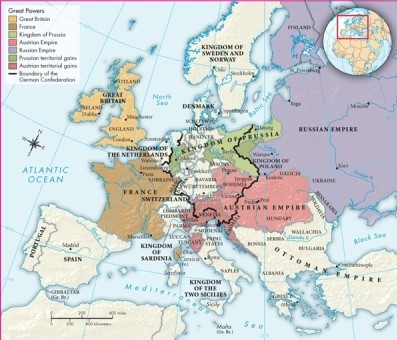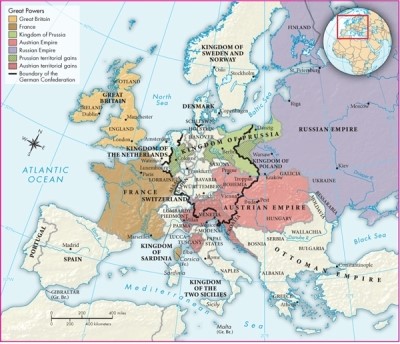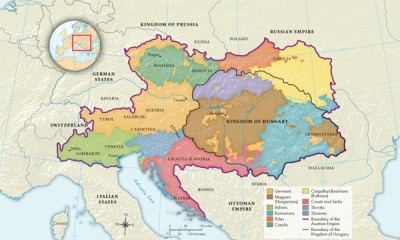Exam 21: Ideologies and Upheavals 1815-1850
Exam 1: Origins to 1200 BCE82 Questions
Exam 2: Small Kingdoms and Mighty Empires in the Near East72 Questions
Exam 3: The Development of Greek Society and Culture78 Questions
Exam 4: Life in the Hellenistic World 336-30 BCE69 Questions
Exam 5: The Rise of Rome CA 1000-27 BCE74 Questions
Exam 6: The Roman Empire 27 Bce-284 CE76 Questions
Exam 7: Late Antiquity 250-60077 Questions
Exam 8: Europe in the Early Middle Ages 600-100081 Questions
Exam 9: State and Church in the High Middle Ages 1000-130081 Questions
Exam 10: Life in Villages and Cities of the High Middle Ages 1000-130074 Questions
Exam 11: The Later Middle Ages 1300-145075 Questions
Exam 12: European Society in the Age of the Renaissance 1350-155075 Questions
Exam 13: Reformations and Religious Wars 1500-160078 Questions
Exam 14: European Exploration and Conquest 1450-165074 Questions
Exam 15: Absolutism and Constitutionalism CA 1589-172581 Questions
Exam 16: Toward a New Worldview 1540-178983 Questions
Exam 17: The Expansion of Europe 1650-180076 Questions
Exam 18: Life in the Era of Expansion 1650-180075 Questions
Exam 19: Revolutions in Politics 1775-181581 Questions
Exam 20: The Revolution in Energy and Industry CA 1780-185081 Questions
Exam 21: Ideologies and Upheavals 1815-185081 Questions
Exam 22: Life in the Emerging Urban Society 1840-191476 Questions
Exam 23: The Age of Nationalism 1850-191479 Questions
Exam 24: The West and the World 1815-191478 Questions
Exam 25: War and Revolution 1914-191981 Questions
Exam 26: The Age of Anxiety 1880-194078 Questions
Exam 27: Dictatorships and the Second World War 1919-194580 Questions
Exam 28: Cold War Conflict and Consensus79 Questions
Exam 29: Challenging the Postwar Order 1960-199177 Questions
Exam 30: Life in an Age of Globalization 1990 to the Present80 Questions
Select questions type
The following excerpt is from the introduction to Jacob and Wilhelm Grimm's Children's Stories and Household Tales (Evaluating the Evidence 21.3): "The true value of these tales must really be set quite high: they put our ancient heroic poetry in a new light that could not have been produced in any other way. Briar Rose [or Sleeping Beauty], who is put to sleep after being pricked by a spindle, is really Brunhilde, put to sleep after being pricked by a thorn. . . . Snow White sleeps peacefully with the same glowing red colors of life on her cheeks as Snaefrid, the most beautiful woman of all, at whose coffin sits Harald the Fair-Haired [Brunhilde, Snaefrid, and Harald are characters from ancient Germanic myths]. . . . These folktales have kept intact German myths that were thought to be lost. . . ."
The Grimms linked Snow White and Sleeping Beauty to
Free
(Multiple Choice)
4.9/5  (33)
(33)
Correct Answer:
B
The romantic movement was characterized by
Free
(Multiple Choice)
4.7/5  (31)
(31)
Correct Answer:
A
Many Europeans and Americans embraced the Greek Revolution because
Free
(Multiple Choice)
4.8/5  (33)
(33)
Correct Answer:
A
Germaine de Staël urged the French to throw away worn-out classical models and extolled the spontaneity and enthusiasm of the writers and thinkers of
(Multiple Choice)
4.8/5  (42)
(42)
According to Joseph Proudhon in the nineteenth century, property was
(Multiple Choice)
4.9/5  (30)
(30)
The Quadruple Alliance, the nations that defeated Napoleon, included
(Multiple Choice)
4.7/5  (34)
(34)
Why did the idea of a "Greater Germany"-a Germany that would include the German-speaking lands of the Austrian Empire in a national state-fail?
(Essay)
4.8/5  (28)
(28)
The following excerpt is from the introduction to Jacob and Wilhelm Grimm's Children's Stories and Household Tales (Evaluating the Evidence 21.3): "These folktales have kept intact German myths that were thought to be lost, and we are firmly convinced that if a search were conducted in all the hallowed regions of our fatherland, long neglected treasures would transform themselves into fabulous treasures and help to found the study of the origins of our poetry. It works the same way with the many dialects of our language. In them a large part of the words and peculiarities that we had long held to be defunct live on undetected."
The Grimms saw folktales as windows into
(Multiple Choice)
4.8/5  (23)
(23)
According to Map 21.1: Europe in 1815, which countries were considered the Great Powers of Europe in the first half of the nineteenth century? 
(Multiple Choice)
4.9/5  (29)
(29)
According to Map 21.1: Europe in 1815, why was the Austrian Empire able to maintain order in most of Europe between 1815 and 1848? 
(Multiple Choice)
4.8/5  (30)
(30)
In their war of independence against the Ottoman Empire, the Greeks ultimately won the support of
(Multiple Choice)
4.8/5  (36)
(36)
According to the doctrine of laissez faire, the government should intervene in
(Multiple Choice)
4.9/5  (38)
(38)
The following excerpt is from the Karlsbad Decrees, a set of policies that clamped down on liberal nationalists in the universities and the press (Evaluating the Evidence 21.1): "The Diet shall have the right, moreover, to suppress on its own authority, without being petitioned, such writings included in Article 1 [newspapers and periodicals], in whatever German state they may appear, as, in the opinion of a commission appointed by it, are inimical to the honor of the union, the safety of individual states, or the maintenance of peace and quiet in Germany. There shall be no appeal from such decisions. . . ."
This passage amounts to a sweeping attempt at
(Multiple Choice)
4.7/5  (35)
(35)
Although the revolutions of 1848 took place at roughly the same time and in proximity to one another, in certain ways, they were very different from one another. Compare the causation, participants, goals, and outcomes of the 1848 uprisings in France and Austria. What were the key differences? In what ways were they similar?
(Essay)
4.8/5  (37)
(37)
Charles Fourier, a utopian socialist, envisioned mathematically precise communities called "phalanxes" and also urged
(Multiple Choice)
4.9/5  (33)
(33)
According to Map 21.2: Peoples of the Habsburg Monarchy, 1815, which nationalities dominated the Habsburg monarchy? 
(Multiple Choice)
4.8/5  (35)
(35)
In 1849, the revolution in Hungary was brought under control with the help of 130,000 troops sent by
(Multiple Choice)
4.9/5  (31)
(31)
Showing 1 - 20 of 81
Filters
- Essay(0)
- Multiple Choice(0)
- Short Answer(0)
- True False(0)
- Matching(0)